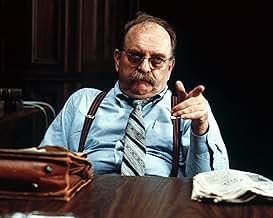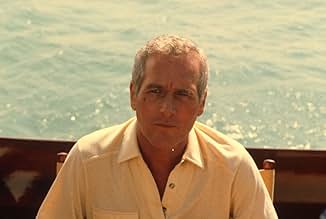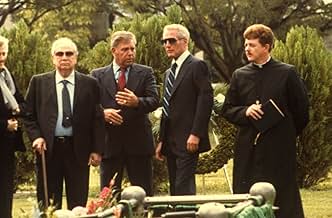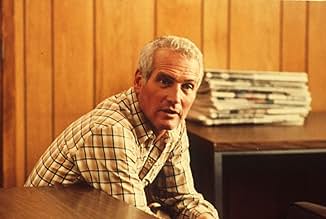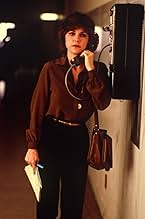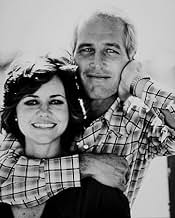VALUTAZIONE IMDb
6,9/10
16.107
LA TUA VALUTAZIONE
Quando un procuratore fa trapelare la falsa storia che il proprietario di un magazzino di liquori è coinvolto nell'omicidio di un capo sindacale, la vita dell'uomo comincia ad andare in pezz... Leggi tuttoQuando un procuratore fa trapelare la falsa storia che il proprietario di un magazzino di liquori è coinvolto nell'omicidio di un capo sindacale, la vita dell'uomo comincia ad andare in pezzi.Quando un procuratore fa trapelare la falsa storia che il proprietario di un magazzino di liquori è coinvolto nell'omicidio di un capo sindacale, la vita dell'uomo comincia ad andare in pezzi.
- Regia
- Sceneggiatura
- Star
- Candidato a 3 Oscar
- 3 vittorie e 8 candidature totali
Phanie Napoli
- Nickie
- (as Anna Marie Napoles)
William Kerwin
- Walker - Standard's Photographer
- (as Rooney Kerwin)
Recensioni in evidenza
This movie provides a clever insight into the principles the press live by. Reporters sometimes lose their basic humanity because they're not looking at the human interest, but at covering all the angles. What's newsworthy is what's in the public domain as fact, not gossip. It's definitely something to think about in this age when large sections of the media are intent on muckraking over the affairs of those who are deemed to be 'high-profile'...
The movie asks us, though, to keep in mind that sometimes there's more going on than meets the eye, and that certain acts function as a means to an end. It can be seen as an extension of that great 70's movie tradition where acclaimed directors make polished films exposing high-level corruption. "Absence of Malice" is an involving exercise in paranoid mystery, with Newman in fine form as always, and Sally Field providing capable support.
The movie asks us, though, to keep in mind that sometimes there's more going on than meets the eye, and that certain acts function as a means to an end. It can be seen as an extension of that great 70's movie tradition where acclaimed directors make polished films exposing high-level corruption. "Absence of Malice" is an involving exercise in paranoid mystery, with Newman in fine form as always, and Sally Field providing capable support.
There's really no other word for it. I find the whole of this movie compelling, from Sally Fields' naivete to Paul Newman's innocent who turns the tables on his prosecutors, to the various supporting characters who all have their little niche. The best of all is Wilford Brimley, who gets to chew scenery and totally steal the scene he's in. It's an intelligent drama, addressing a subject as relevant today as it was in '81, with just enough humor to leaven the whole thing.
To begin with, I had intended to include this in my tribute to director Pollack in June but somehow couldn’t trace the VHS I had it taped on; in the meantime, I acquired the film on DVD and, watched now as a valediction to recently-deceased star Paul Newman, it easily emerged as the most significant title of the lot. The picture itself had given new impetus to his career – though it would be overshadowed by his next effort, THE VERDICT (1982) – which had dwindled since the block-busting box-office performances of both THE STING (1973) and THE TOWERING INFERNO (1974).
An absorbing and uniformly well-acted blend of newspaper movie, political thriller, character study and romance (with the latter being the least successful i.e. most disposable and unconvincing element), the film deservedly earned Oscar nominations for Newman (his sixth – playing a longshoreman who starts being investigated about the murder of a rival simply because of his parental link to mobsters and the damage it causes to his integrity and daily existence), Melinda Dillon (as a friend of Newman’s who’s brought in to supply an alibi for him but which would expose the guilt in her own personal matters and which lead her to commit suicide!) and Kurt Luedtke’s fine, incisive script. Sally Field isn’t an actress I’m particularly fond of (for the record, I’ve watched neither of her two Oscar-winning performances in NORMA RAE [1979] and PLACES IN THE HEART [1984]: their directors, Martin Ritt and Robert Benton respectively, would coincidentally prove crucial to Newman himself!), though she’s perfectly cast here in a role encompassing resourcefulness, tenacity, awkwardness, tenderness and, finally, humility. She’s the star reporter who initially ‘leaks’ the news of the investigation on Newman thinking it as her duty, but doesn’t stop to ponder the consequences…as a result of which, her relationship with Newman proves a troubled one (in the film’s most intense sequence, he physically assaults her when she turns up before him after Dillon’s death!).
The title is a reference to a legal clause which basically states that newspapers are free to print anything they like, and that the people involved can do nothing against them because their reporting is accurate (even if it may not ultimately prove to be factual). The film’s climax – which plays like a dry-run for THE VERDICT itself and is highlighted by a scene-stealing turn from Wilford Brimley, it’s revealed how Newman has cleverly rebounded the affair on itself (so that it’s the reporters, the investigating committee and the D.A’s office who get their gooses cooked, as it were!). A nice surprise is Luther Adler’s appearance as Newman’s mobster uncle – and also worth mentioning is Dave Grusin’s fine score.
An absorbing and uniformly well-acted blend of newspaper movie, political thriller, character study and romance (with the latter being the least successful i.e. most disposable and unconvincing element), the film deservedly earned Oscar nominations for Newman (his sixth – playing a longshoreman who starts being investigated about the murder of a rival simply because of his parental link to mobsters and the damage it causes to his integrity and daily existence), Melinda Dillon (as a friend of Newman’s who’s brought in to supply an alibi for him but which would expose the guilt in her own personal matters and which lead her to commit suicide!) and Kurt Luedtke’s fine, incisive script. Sally Field isn’t an actress I’m particularly fond of (for the record, I’ve watched neither of her two Oscar-winning performances in NORMA RAE [1979] and PLACES IN THE HEART [1984]: their directors, Martin Ritt and Robert Benton respectively, would coincidentally prove crucial to Newman himself!), though she’s perfectly cast here in a role encompassing resourcefulness, tenacity, awkwardness, tenderness and, finally, humility. She’s the star reporter who initially ‘leaks’ the news of the investigation on Newman thinking it as her duty, but doesn’t stop to ponder the consequences…as a result of which, her relationship with Newman proves a troubled one (in the film’s most intense sequence, he physically assaults her when she turns up before him after Dillon’s death!).
The title is a reference to a legal clause which basically states that newspapers are free to print anything they like, and that the people involved can do nothing against them because their reporting is accurate (even if it may not ultimately prove to be factual). The film’s climax – which plays like a dry-run for THE VERDICT itself and is highlighted by a scene-stealing turn from Wilford Brimley, it’s revealed how Newman has cleverly rebounded the affair on itself (so that it’s the reporters, the investigating committee and the D.A’s office who get their gooses cooked, as it were!). A nice surprise is Luther Adler’s appearance as Newman’s mobster uncle – and also worth mentioning is Dave Grusin’s fine score.
... as audiences would not relate to anything this cynical prior to Watergate. This was made only seven years afterwards.
Sally Field is an ethically-challenged reporter. With the help of an even more unscrupulous federal investigator, played by Bob Balaban, she writes a story that implicates Michael Gallagher (Paul Newman) in the disappearance & presumed murder of a union boss. Gallagher is on the radar because his uncle is a mobster. The film employs a procedural narrative that delivers little dramatic tension. The severest act happens off screen. The characters feel slightly underwritten. The exception is Melinda Dillon's poignant portrayal of Teresa Perrone, Gallagher's best friend, who occupies the moral epicenter.
While everyone else is playing a game of extreme cynicism, not uncommon in journalism and politics, Teresa feels most acutely. I liked the straight-forward approach and lack of style. Of course, director Sydney Pollack was never known as a stylist. I'm not saying this in the pejorative. I enjoy Pollack's work. Wilford Brimley makes a needed, late appearance to munch down on some scenery.
It does have the distinct feel of a film made to make a go for the Oscars, with Paul Newman making repeated failed runs at the Best Actor prize at this point in his career. Still Newman in the lead gave gave a film at that time the same amount of heft that Tom Hanks in the lead gives a film today.
Sally Field is an ethically-challenged reporter. With the help of an even more unscrupulous federal investigator, played by Bob Balaban, she writes a story that implicates Michael Gallagher (Paul Newman) in the disappearance & presumed murder of a union boss. Gallagher is on the radar because his uncle is a mobster. The film employs a procedural narrative that delivers little dramatic tension. The severest act happens off screen. The characters feel slightly underwritten. The exception is Melinda Dillon's poignant portrayal of Teresa Perrone, Gallagher's best friend, who occupies the moral epicenter.
While everyone else is playing a game of extreme cynicism, not uncommon in journalism and politics, Teresa feels most acutely. I liked the straight-forward approach and lack of style. Of course, director Sydney Pollack was never known as a stylist. I'm not saying this in the pejorative. I enjoy Pollack's work. Wilford Brimley makes a needed, late appearance to munch down on some scenery.
It does have the distinct feel of a film made to make a go for the Oscars, with Paul Newman making repeated failed runs at the Best Actor prize at this point in his career. Still Newman in the lead gave gave a film at that time the same amount of heft that Tom Hanks in the lead gives a film today.
Mighty good drama depicting corruption in the justice department intending, on the surface, to solve a crime, but, beneath the waters, to further political careers. Sally Field played the self centered, self deluded reporter perfectly against Newman's confused, angry victim. Worth seeing.
Lo sapevi?
- QuizPaul Newman once said of this movie while publicizing Il verdetto (1982): "I'd rather have the freedom to do the kind of pictures like Il verdetto (1982) ... I enjoyed kicking the beejeezus out of the press in Diritto di cronaca (1981)."
- BlooperAfter spending his first night with Megan, Michael tells her as he is leaving that it is 5:30 a.m. It is clearly daylight outside. In Miami in mid-December, it would still be dark outside at that time.
- Citazioni
James J. Wells: You had a leak? You call what's goin' on around here a leak? Boy, the last time there was a leak like this, Noah built hisself a boat!
- ConnessioniEdited into Absence of Satan (1985)
I più visti
Accedi per valutare e creare un elenco di titoli salvati per ottenere consigli personalizzati
Dettagli
Botteghino
- Budget
- 12.000.000 USD (previsto)
- Lordo Stati Uniti e Canada
- 40.716.963 USD
- Fine settimana di apertura Stati Uniti e Canada
- 97.667 USD
- 22 nov 1981
- Lordo in tutto il mondo
- 40.716.963 USD
Contribuisci a questa pagina
Suggerisci una modifica o aggiungi i contenuti mancanti


